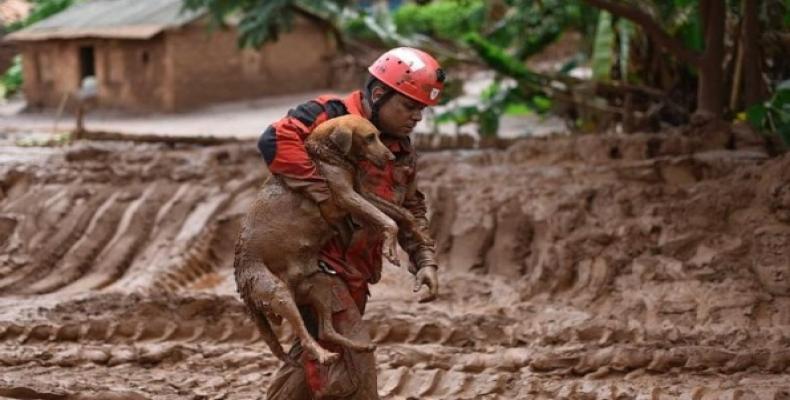Brasilia, November 26 (teleSUR-RHC)-- The United Nations Office of the High Commissioner for Human Rights said Wednesday that the mud spill released from a dam collapse at an iron ore mine in Brazil earlier this month is in fact toxic, debunking claims by the mine's operator that the mud was “chemically stable.”
Citing "new evidence," the U.N. human rights agency said in a statement the residue "contained high levels of toxic heavy metals and other toxic chemicals."
The disaster has killed at least 12 people, displaced more than 500 and released 60 million cubic meters of mine waste — equivalent to 20,000 Olympic swimming pools — which were released into the river, cutting off drinking water for a quarter of a million people.
"The scale of the environmental damage is the equivalent of 20,000 Olympic swimming pools of toxic mud waste contaminating the soil, rivers and water system of an area covering over 850 kilometers," the U.N. agency's special rapporteur John Knox said in the statement.
Samarco, the mine operator at the site, and Samarco's co-owner, Anglo-Australian mining giant BHP-Billiton, maintained their position that the water and mineral waste contained by the dam were made up of clay and silt from processing earth containing iron ore and would not be changing the water’s composition in the Rio Doce river.
"They will not change chemical composition in water and will behave in the environment like normal soils in the catchment," BHP said Thursday in a statement without commenting on the U.N. report.
Meanwhile, mining giants BHP-Billiton and the Brazilian firm Vale agreed to pay $260 million through their Brazilian subsidiary Samarco to the Brazilian government for damages caused by the environmental catastrophe. Brazilian mining firm Vale co-owns Samarco with BHP-Billiton.
According to prosecutors, the extent of damage could amount to much more than the $260 million pledged by Samarco. Deutsche Bank estimates the total cost of cleanup could be as much as $1 billion.
Brazil's government has called the country's worst-ever environmental disaster as biologists expressed shock and worry over the impact of the burst dam.
“As there was never an environmental incident of this magnitude, it is impossible to calculate the real impact right now,” Klemens Laschefski, a researcher at the Federal University of Minas Gerais, told Chemistry World on November 21st.
He added that changes in the flow of the river in respect to the currents and the new geochemical conditions in the sediments “will bring profound ecosystem changes, which will also influence the species, including with the possibility of disappearance of endemic species.”
The U.N. statement criticized the response of the companies as "insufficient," and called on the Brazilian government to do more. "[T]he government and companies should be doing everything within their power to prevent further harm".


